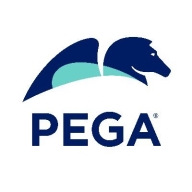

Pega Platform and Informatica IDMC compete in business process management (BPM) and data management categories. Pega shows strength in rapid deployment and low-code features, while Informatica IDMC excels in advanced data management capabilities and AI integration.
Features: Pega Platform offers easy process adaptability, fast prototyping, and robust case management, making it appealing for enterprises seeking responsive BPM solutions. Informatica IDMC provides seamless data management, comprehensive data cleansing, and sophisticated tools for data governance, ideal for complex enterprise needs.
Room for Improvement: Pega could simplify its cloud integration, pricing, and upgrade processes and cater better to citizen developers. Informatica IDMC needs enhancements in user interface and ease of integration with non-SAP applications, along with revisions to its pricing models for better cloud and on-premise support.
Ease of Deployment and Customer Service: Pega Platform is adaptable to multiple environments like on-premise and hybrid clouds, although it requires improved support responsiveness. Informatica IDMC offers extensive deployment scenarios with robust technical support but faces challenges in addressing unique customer issues promptly.
Pricing and ROI: Pega Platform is considered expensive but offers scalable solutions yielding substantial ROI through efficiency gains, suitable for large enterprises. Informatica IDMC's pricing can be complex, yet users appreciate its capabilities for enhancing operational efficiencies and enterprise analytics, resulting in significant ROI.
The response time is pretty good because we have someone in-house, who is an expert from Informatica, in our team who can help us with any sort of queries usually.
Due to the tool's maturity limitations, solutions are not always simple and often require workarounds.
The technical support from Pega is very low, rating a one or two out of ten.
I never needed support from the platform standpoint, but if additional features are required, we have regular meetings with the product team for feedback.
Pega's technical support team is very helpful.
As a SaaS platform, IDMC is quite scalable and provides complete flexibility.
Stability is crucial because IDMC holds business-critical data, and it needs to be available all the time for business users.
I also want to see integration with other Informatica products, such as IICS, to leverage the metadata from EDC.
The tool needs to mature in terms of category-specific attributes or dynamic attributes.
Pega introduced Constellation, which allows a user to build a more engaging visual experience.
My learning curve in robotics has been challenging.
It ranges from a quarter million to a couple of million a year.
I think the costs are reasonable for the kinds of features that Informatica Intelligent Data Management Cloud (IDMC) has.
Pega is priced higher than open-source options like Flowable but is suitable for large-scale industries like banking and insurance.
The pricing is expensive, and this is an issue.
The platform's ability to pull in data from other platforms without the need for an additional integration tool enhances its appeal.
Informatica Intelligent Data Management Cloud (IDMC) can connect to pretty much any application, including Oracle Analytics and Power BI, and it works quite seamlessly.
Pega Platform is excellent for enterprise-level solutions with integrations to entire systems, including case management, service orchestration, CRM, decision-making capabilities, digital process automation, and AI-driven functionalities.
Management capabilities such as dashboards.


Informatica Intelligent Data Management Cloud (IDMC) is a robust platform used by banks, financial institutions, and health sector organizations for data management, governance, and compliance.
IDMC provides comprehensive tools for data discovery, profiling, masking, and transformation. It supports Salesforce integration, real-time data streaming, and scalable data management solutions. Health organizations manage national product catalogs while financial entities focus on data protection and regulatory compliance. Its intuitive interface, flexible features, and robust tools make it valuable across sectors, though enhancements in data integration and human workflow are being sought.
What are the most important features?
What benefits and ROI should be considered?
Banks and financial institutions use IDMC for data masking, transformation, and compliance, while health sector organizations leverage it for national product catalogs. Industry applications focus on automating business processes, centralizing data, and managing data catalogs to meet regulatory demands and ensure data protection.
Pega Platform facilitates business process management, case management, and workflow automation for industries like banking, insurance, and healthcare. It supports digital transformation and customer service enhancements with its low-code capabilities and seamless integrations.
Pega Platform enables users to create efficient systems for case management, financial operations, and digital transformations. It provides tools for client onboarding, quoting, claims processing, customer experience improvements, and content management. Pega's low-code approach allows for the automation of complex processes, making it suitable for enterprises looking for adaptability and rapid deployment. While it offers strong real-time analytics and decision automation, users acknowledge challenges in user interface, integration, and performance aspects. High costs and a learning curve need attention, and enhancements in AI features and cloud services are desired.
What are the key features of Pega Platform?In banking, Pega Platform automates loan processing, accelerates customer onboarding, and manages compliance. Insurance companies benefit from streamlined claims processing and policy management. Healthcare sectors use the platform for patient engagement and care coordination, enabling organizations to adapt quickly to changing industry requirements.
We monitor all Business Process Management (BPM) reviews to prevent fraudulent reviews and keep review quality high. We do not post reviews by company employees or direct competitors. We validate each review for authenticity via cross-reference with LinkedIn, and personal follow-up with the reviewer when necessary.